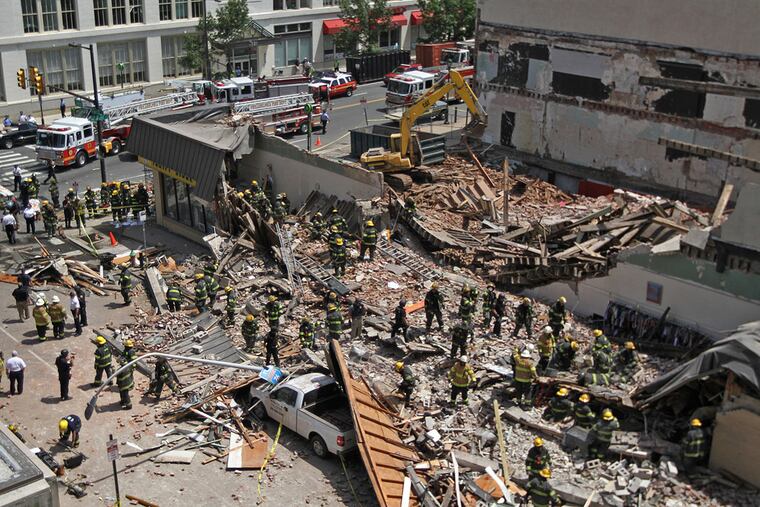I was responsible for building safety in Philly. We don’t need more codes to prevent another collapse. | Opinion
The Florida condo disaster should push us to demand more accountability from those who are responsible for enforcing those codes.

When the news about the collapse of the Champlain Towers South condominium in Florida reached Philadelphians, many of us shared a horrified shiver of recognition.
We are no stranger to the tragedy of building failures. In 2013, demolition at an adjacent building caused the Salvation Army on Market Street to collapse, killing six people. In 2000, a nightclub on Pier 34 fell into the Delaware, killing three.
As a professional engineer and a former commissioner of the city’s Department of Licenses and Inspections, which oversees our city’s building code enforcement, these tragedies were all nightmare scenarios. During my tenure, we lost four young children in a fire at a homeless shelter on Broad Street. While not actually a building failure, the deaths of those children while on my watch have been indelibly seared into my memory.
» READ MORE: To avoid a Surfside tragedy in Philly, building codes need scrutiny now | Opinion
The disaster in Florida is prompting concerns about our building codes, which is very understandable. But the notable building failures in Philadelphia were not failures of codes and related regulations — they were failures resulting from irresponsible actions by those who had the professional and legal obligation to enforce those standards.
We do not need more regulations. What we do need is to make sure that those who have the power to enforce those regulations are made aware of dangerous conditions as soon as they are discovered, and more accountability if anyone fails in those responsibilities.
Our city has managed the code process relatively well in recent years, despite enormous political obstacles; today, Philadelphia has the most current building code of any jurisdiction in the state.
In each of the most recent notable failures in Philadelphia, there was prior knowledge of the potential for a catastrophe, and in each instance, those with knowledge of that potential failed in their response.
There was no lack of appropriate codes, just a failure by architects and/or engineers who had knowledge of the dangerous situation and had the legal obligation as a consequence of their licensure by the state to notify L&I, and/or city officials who did nothing when made aware of those dangerous situations.
To ensure public safety in our building stock, we need to hold accountable the people who are truly responsible when failure occurs. We need a mayor and a city council who can ensure that L&I is fully functional. The mayor needs to appoint commissioners, deputy commissioners, and members of the Board of Building Standards who are competent and qualified to discharge their responsibilities. L&I has had a troubled history, but if the agency is budgeted, staffed, and managed appropriately, it can do its job properly in ensuring public safety.
In the years leading up to the Salvation Army building tragedy in 2013, the L&I budget had significantly decreased, and the number of staff had been cut by one-third since 2002. The investigation into the building collapse found that, at the time, L&I’s inspectors were supposed to complete 22 inspections a day on average, which works out to four inspections per hour over eight hours. (The inspector who had been assigned to the site committed suicide, which his wife attributed to guilt over the collapse.)
Building permit fees should cover the cost of construction permitting and the inspection process. That is state law. If more inspectors are needed to cover the workload, then raise the permit fees and hire more inspectors, rather than overworking the remaining staff. If you do not want to raise fees to cover the costs of an adequate inspection staff, then privatize portions of the inspection process, as allowed by state law.
We cannot afford to lard up our codes with more regulation, the cost of which impacts those who can least afford it, as we witness daily with the lack of affordable housing stock in our city. We need to insist on more responsible behavior from those empowered by law to protect the public from the tragedies we have experienced here, and now watch unfold in Florida. We need people who, when they see something, say something; and people who, when they are told about a potential problem, do something about it.
Bennett Levin is an engineer based in Washington Crossing and former commissioner of the Department of Licenses and Inspections in the City of Philadelphia from 1992-1995.